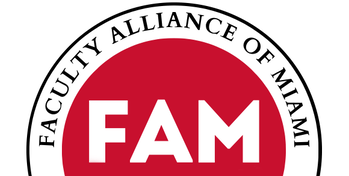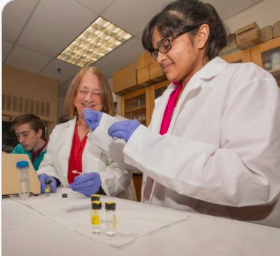This letter to the editor from Miami AAUP was published in the Miami Student on April 21, 2021.
Faculty choose Miami as an academic home for some of the same reasons that students and their families do: because Miami’s faculty are dedicated to research and scholarship both inside and outside of the classroom. Institutions that value both quality teaching and rigorous scholarship are not as common as you might expect. Most universities focus on having either a teaching or a research strength. Universities that retain tenure-line faculty based on performance in the classroom typically have limited scholarship expectations, while others that focus primarily on faculty scholarship have classroom engagement as a secondary concern (in some cases, the “most successful” faculty rarely engage with undergraduates).
Having scholars in the classroom matters to the value of a Miami education and degree.
Miami, however, attracts faculty researchers, scholars, and creative practitioners that are dedicated to both. Faculty who excel only in scholarship or only in classroom teaching are unlikely to earn tenure at Miami. Miami’s teacher-scholar model is an academic balancing act that requires careful management from faculty members to be successful, as well as active support from decision-makers at the institution. But changes in workload have been throwing the teacher-scholar model out of balance, risking loss of the scholarship component.
Having scholars in the classroom matters to the value of a Miami education and degree. Scholars not only read and study the literature of their discipline—they are the creators of the literature, and students at Miami can work alongside them at the very edge of our human understanding. While faculty at research universities can view working with undergraduate scholars as inefficient (because it takes significant time to mentor students), Miami faculty embrace teaching and scholarship as if they were covalently bonded atoms. Miami faculty aim to take students on a journey of discovery-motivated scholarship, encouraging students to engage actively in meaningful work that leads to publications and performances and builds student expertise, confidence, and resumes. Involving undergraduate and graduate students in scholarship helps train the next generation of citizens, experts, and scholars—and Miami faculty are dedicated to this pursuit.
Changes in workload have been throwing the teacher-scholar model out of balance, risking loss of the scholarship component.
Faculty are increasingly concerned that expansions of academic workloads resulting from the pandemic are not just emergency measures, but permanent changes. Some faculty’s course loads have doubled; many have had courses added to already teaching-heavy schedules and class sizes have grown. Increased teaching loads and class sizes have necessitated changes to the types of assignments we give, the ways we test and evaluate student knowledge, our opportunity to update and prepare classes that intellectually engage students, and even (honestly) our ability to respond to student emails. Increases in faculty workloads also affect our capacity to accommodate independent studies, summer scholars, and student researchers, reducing our ability to mentor student-devised projects or foster faculty-student collaborations. These changes are largely dictated by the reality of limited time. Increased teaching loads reduce time for scholarship and will harm student outcomes, recruitment, retention, and career preparation.
Faculty want to continue to be teacher-scholars. This calling requires an administration that understands, values and prioritizes the centrality of this model to Miami’s quality, supporting faculty scholarship so that faculty in turn can foster student learning and engagement.
There is still time to restore the balance. Miami’s Unifying Goal is to “promote a vibrant learning and discovery environment that produces extraordinary student and scholarly outcomes.” Extraordinary outcomes require commitment of both time and resources. We realize that the university is facing significant challenges and is trying to secure a bright future. Yet if the decisions we make do not ensure and promote the quality of undergraduate and graduate education, we will suffer a Pyrrhic victory.
Miami AAUP Advocacy Chapter Steering Committee


Leave a Reply